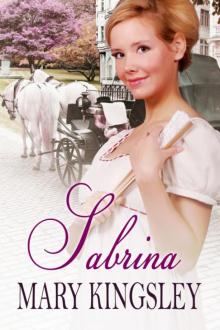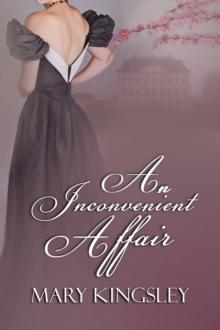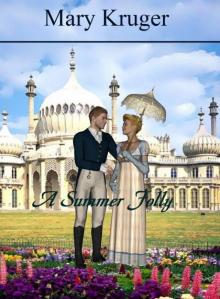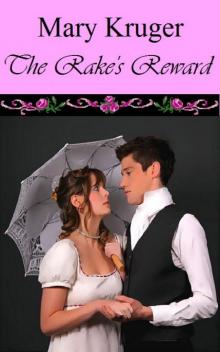- Home
- Kruger, Mary
Rake's Reward Page 6
Rake's Reward Read online
Page 6
Cecily tossed her head, a mannerism which worked quite well for her sister, but which she had never tried before. “He and I suit quite well.”
“Indeed. So you don’t love him.”
“I didn’t say that!”
“You didn’t have to. I suppose it should be expected.”
She turned to look at him, with her clear golden eyes that made him feel, uncomfortably, that she could see right through him. “You don’t believe in love.”
“No sensible person believes in love.”
Cecily stopped. Unaware, Alex went on a few paces. Had no one ever loved him, then? But he had his choice of women; he could have anyone he wanted. And perhaps that, she thought with dawning wisdom, was part of the problem.
Alex turned in the saddle. “Is aught wrong?”
“Hm? No.” She walked the few paces to meet him, and then stopped, her eyes searching his face. “Poor rake,” she said, softly, and reached out with gentle fingers to touch his face.
Alex jerked back. “God’s teeth, madam! What do you think you are about?”
“Nothing.” Cecily withdrew her hand and glanced away. “I must be getting home, before I’m missed.”
“So soon?” he said, before he could stop himself. Belatedly he had realized that he hadn’t come here to talk with her, pleasant though it had been. No, he had come to spy on her. The word left a bitter taste in his mouth. To spy on a girl he was beginning to think might be involved only peripherally, if at all, in nefarious doings; to spy on an innocent. At least, he hoped she was innocent.
“I’m flattered, sir,” she said, her voice light, “but the sun is rising higher and I dare not be caught.”
“No, of course not.” Alex’s voice sounded normal as he turned Azrael to walk with her. He didn’t want her to go. He wanted her to stay, and to see whom she met. No, that wasn’t true. He wanted her to stay with him. What did she see in Edgewater, that useless fribble of a man? “You’d best go,” he said, abruptly.
“Yes. And will I see you tonight at whatever affair I attend?” Her voice was airy, but for just a moment, he thought he saw hurt in her eyes.
“I doubt it.” Alex suddenly reached a decision. This girl was no more guilty of fomenting revolution that he was. He didn’t know why Barnes had said her name; perhaps he never would. One thing he did know, though. She did not have the duplicity in her to appear as she did, now, and at the same time work towards her country’s undoing, unless she were a superb actress. No, she was innocent, and that meant that his task was done. He would report to Bainbridge, and go back to his own life, forgetting about her. He would have to. She was dangerous, this little one, in a way few other women ever had been. If anyone could make him trust again, she could, and he had learned, long ago, never to trust anyone. Not even sweet, innocent girls with luminous golden eyes. “I’ve grown rather tired of the social round. The grasping debutantes and their doting mamas, and the people who have nothing better to do than to gossip and cut up one’s reputation.”
“I see.” Cecily’s eyes suddenly sparkled with mischief. “We can safely assume, then, that you aren’t hanging out for a wife.”
“God’s teeth, no! And where did you learn cant?”
“From my brother.” She tossed her head again, pleased that he wasn’t interested in any other young lady. “Then perhaps I’ll see you riding.”
“I don’t think so. I find rising so early fatigues me,” he said, sounding bored. It was best to make the break now, and to make it clean, he thought, before he made the mistake of turning to look at her.
The hurt was in her eyes again, and it was more than he could bear. Before he could stop himself, Alex reached over and touched her cheek. “Have a good life with your suitable marquess, little one,” he said, and set Azrael to the gallop, riding away before he could do anything else stupid. Like reaching for her hand, or pulling her off her horse into an embrace, and—
God’s teeth! It was better this way. He would go on with his life and forget he’d ever met her. He would have to. She was engaged to someone else.
Cecily’s vision blurred as she watched him ride away. It had to be the sun, risen above the treetops now and shining directly into her face, that was making her eyes water; why should she cry? Her life was perfect. She had money, position, and a match that, if not the most romantic, was suitable. There was no room in her life for a rake with sad eyes and a wounded soul. No, she was much better off without him. She was glad he had said good-bye, she thought, turning Dancer towards home. Very glad.
She felt blue-deviled throughout the day, though, even when her fiancé came by in the afternoon to escort her to Hatchard’s. Not believing in self-pity, Cecily was thoroughly disgusted with herself by the time she came downstairs to meet the marquess, attired in a walking dress of pale green, with a spencer of deeper green over it. Her high-crowned bonnet of Leghorn straw was trimmed to match her spencer. For once her appearance was impeccable; not a curl was out of place, not a ribbon twisted, and a smile of delight was pasted to her lips as she held out her hand. With every appearance of equal delight, the marquess bent over it, and involuntarily Cecily remembered another man bowing just so, a man with darker hair, whose touch had quite burned through her gloves—
“You are looking lovely this afternoon, Cecily,” the marquess said, and Cecily looked up. Ridiculous to be thinking of another man, when she had such a handsome fiancé paying her court. Today Edgewater was attired in a coat of pearl-gray superfine, which nearly matched his eyes. Watchful eyes, Cecily realized, and detached. A little cool, not at all like the warm blue gaze she had felt on her this morning and would never feel again.
“A fine afternoon for a walk,” Edgewater went on, tucking her arm through his proprietorially and leading her towards the door. Cecily mentally shook herself. She would have to forget St. Clair and concentrate instead on her fiancé. St. Clair was not for her, even if he were at all interested in her. Which he wasn’t, she told herself, firmly. She was a very lucky girl, to be engaged to a man who was not only handsome, but was one of the leaders of the ton. With him, her future was assured.
And so, to ease a conscience that felt uncomfortable, if not actually guilty, she set herself to be charming as they strolled together down the street, her maid trailing behind to act as chaperone. She told Edgewater of her life at Marlow, the huge estate just north of London, which she missed. She entertained him with stories of people met at various soirees, routs, and balls, using her natural gift for mimicry to bring them to life. She even told him about Dancer, which earned her a look from him under raised eyebrows.
“A dancing horse? Forgive me, my dear, if I find that a trifle hard to believe,” Edgewater said, though he smiled.
“But ‘tis true, my lord. Perhaps we might go riding someday, and I’ll show you. He dances if I sing.”
Edgewater took a moment, frowning, to flick away an infinitesimal speck of lint that had dared to land on his sleeve. “I trust that no wife of mine would do anything so undignified.”
Cecily, encouraged by the slight smile that accompanied those daunting words, went on, heedless. “But it is above all things great, my lord. He’s vastly entertaining.”
“Like a circus, which is for children. You are not a child, my dear.”
“No, I am not,” Cecily said, her voice more subdued.
“And if I should wish to see such a thing, I would go to Astley’s. Though that is a little below us, my dear, and not worth the money.”
As good as anything I’ve seen at Astley’s. The words from a long-ago encounter in the park with a handsome man riding a black stallion came back to her, and she pushed them away. “I do enjoy Astley’s,” she said, almost defiantly, “but perhaps not so much as I did as a child.”
“Of course not.” Edgewater doffed his hat at a passing acquaintance. “You are a woman now, Cecily. A lovely young woman, I might add.” This last was added in such an absent tone of voice that Cecily’s own eyebrows rose. “Suc
h behavior is beneath you.”
“I hope I’ll always be able to laugh and enjoy myself, sir, no matter what my age. My grandmother Marlow, the dowager duchess, was unable to come to London with us because of ill health, but she is one of the most cheerful, amusing people I know! But, there, I don’t want you thinking I am light-minded, sir,” she went on, as they turned onto Piccadilly. “Several years ago my father started a school on the estate for the children of the tenants, and I’ve become very interested in it. I even persuaded Papa to let the village children attend. I enjoy working with the children and helping them to learn to read and write.”
The patronizing smile had left Edgewater’s face. “Another thing that you will not be doing as my wife, I trust.”
Cecily stopped. “But why not?”
“Come, Cecily, we are creating a scene.” He tugged on her arm. “Because it won’t be a suitable activity for you.”
“Not suitable! But, sir, you’re interested in the plight of the poor! Why cannot I be?”
“Because you are to be my wife, and I won’t have you exposed to such influences.” He reached past her to open the door of Hatchard’s. “Come, my dear, we shall discuss this at another time.”
“We certainly shall,” Cecily murmured, her cheeks pink and her stomach churning with a combination of anger and dismay. What did he expect of her as his wife? That she would be a docile helpmeet only, who never spoke her mind? She had hoped for better things from married life, that she would at last be free to talk as herself, to be herself, without receiving a scolding from a disapproving parent.
“M’lord Edgewater! Good day to you!” a voice boomed, and both Edgewater and Cecily turned. Coming towards them was a rotund, genial-faced man, his clothing, though of good quality not the best, his huge hand outstretched. “Remember me? Josiah Worley, sir. There’s much we needs must discuss.”
“Is there?” Edgewater said, in such icy tones that Cecily glanced up at him, startled. His eyes were hard and cold, and his left eyelid twitched. “I believe not. I bid you good day.” And with that he ushered Cecily into the book shop, leaving the other man, standing, spluttering, on the pavement.
“Heavens!” Cecily had recovered her poise. “Edward, whoever in the world was that?”
“A Cit,” he said, curtly. “Beneath your notice.”
Cecily peeped through the panes of Hatchard’s front window, to see the man, his face mottled with anger. “He looks prosperous enough.” Her eyes danced as she turned back. “Edward, don’t tell me you actually engage in trade!”
The look Edgewater gave her was enough to freeze her where she stood. “I suggest you select your books, my dear,” he said, mildly enough.
“Yes, Edward,” Cecily murmured, bewildered, and turned away, her mind whirling with all that had happened. Edgewater, however, seemed his usual urbane self. Proclaiming that he wasn’t much interested in reading, he followed Cecily down the aisles, occasionally complaining about the fees she would spend on such claptrap as the scary Gothic romances which were all the rage, and which she enjoyed. For her part, Cecily was preoccupied. How best to go about convincing Edgewater that she could actually help him in his work, if he would allow her? At the moment, she had no answer to that question.
They emerged from Hatchard’s into a day grown overcast and chilly. Edgewater signaled for a hackney, his face showing his distaste at having to ride in such a pedestrian vehicle. Holding his hand out to Cecily, he was just about to help her in when a voice spoke behind them.
“Please, sir, can’t you help a poor man?”
Cecily turned, and saw a man huddled against the building, the tatters of a once-proud uniform hanging about him. Like many soldiers at war’s end, he apparently had not been able to find work, and he looked unwell. “Oh, the poor man! Edward, do please help him.”
Edgewater spared the man no more than a glance. “I’ll not waste my money on such as he. He should find work.”
“But he can’t! He’s ill. Oh, very well.” She fumbled in her reticule. “If you won’t—”
“Cecily, I forbid you to give him anything. You are only encouraging him.”
“Here, sir.” Cecily held out a coin. “Little enough, I know, but I hope it will get you a hot meal at least.”
“God bless you, miss,” the man said, reaching for her hand, as if to kiss it. Before he could do so, however, Edgewater’s walking stick came smartly down on his wrist, making him yelp and pull back.
“Get away from the lady, or I’ll have the watch on you.” Edgewater’s face was set in a cold sneer.
“Edward,” Cecily protested again.
“Be quiet. And if you don’t stop bothering good people, I’ll see you sent to gaol.”
The man’s eyes, burning now with hatred, went from Edgewater to Cecily. “God bless you, miss,” he said again, “and God help you, too. I pity you.” With that, he turned, and, with great dignity, hobbled away.
“Pity you! Of all the damned nerve—”
“Edward.” Cecily caught at his arm, noting the bunching of muscles in an arm that she’d never thought particularly strong before. “Let him go. He can’t do anything to you.”
“He is an insolent cur, and should learn to mend his manners!” Edgewater turned back, his eyelid twitching furiously. “That he should dare to pity you, when you are engaged to the Marquess of Edgewater!”
“I’m sure that’s not what he meant,” Cecily said, soothingly. “Come, it is raining harder. You don’t wish the rain to spot your coat.”
“What? No, of course not, my dear, you are absolutely right.” Edgewater’s face relaxed as he turned to help Cecily in, and though he was a genial companion on the ride back to Marlow House, Cecily could not relax. She didn’t think she’d ever forget the way he had looked when he had grown angry at the beggar, and she devoutly hoped that she, herself, would never inspire such anger. What, she wondered, had happened to Edgewater’s much-vaunted concern for the poor?
At Marlow House Cecily turned to Edgewater with relief, holding her hand out to him. What she needed now was time, to sort through her conflicting emotions and consider some way to deal with this unexpected side of her intended. Instead, Edgewater took her arm in the same possessive grip and walked into the house with her, though she had not invited him.
“Good afternoon, Timms,” she said, smiling at the butler. “Are my mother and sister returned yet?”
“No, my lady.” Timms’s face, which no one had ever seen smile, remained wooden. “They are still shopping, I believe.”
“Oh.” She turned towards Edgewater. “Then, sir—”
“Are you not going to invite me up to the drawing room, Cecily?” Edgewater said, smiling, with just a hint of challenge in his eyes.
Cecily glanced at Timms. It would not be proper to receive Edgewater alone, even if he were her fiancé, but, at the same time, she didn’t wish to argue the matter here. Timms, for all his appearance of detachment, was, as she well knew, an avid gossip. “Of course, sir,” she said, finally, and turned towards the stairs, not speaking further until they were alone in the drawing room. “But you know this is not at all proper.”
“Isn’t it?” There was a funny little smile on his face, making her just the slightest bit uneasy. “But we are betrothed, Cecily. Surely no one would object if we spent some time together? I rarely get to see you alone.”
“But, sir,” she protested, as he slipped his arms about her waist.
“Do you know, Cecily, you are really quite attractive.” He sounded a bit surprised as he studied her face, so closely and with such a detached manner that she wanted to turn her head away. “It is fortunate you know which colors to choose, otherwise you’d look sallow.”
“How flattering, sir,” she said, lightly, while, against her will, she heard another voice, a deeper voice, telling her that her skin was a delightful rosy gold. Oh, go away! she thought. Go away, St. Clair, and leave me in peace!
“I am fortunate to have found
you,” Edgewater went on, as if unaware of her reaction. “I think we will deal very well together, indeed.”
His head bent towards her, the scent of the sandalwood cologne he always wore almost suffocating her. Oh, heavens, he’s going to kiss me! In spite of her confusion, in spite of her distaste for his earlier actions, she couldn’t suppress the little spurt of excitement that went through her. She had never been kissed before. Prompted by curiosity, Cecily raised her face and let his lips meet hers. And—nothing happened.
She had closed her eyes as his head bent, but now she opened one again, peering cautiously at his face, so close, wearing a rapt expression. The pressure of his lips on hers increased, but still she felt nothing, only the sensation of flesh touching flesh. What was so wonderful about this? Where was the union of souls she had been led to expect from the books she read? Why didn’t she feel the slightest desire to swoon? Instead, she glanced quickly towards the ormolu clock ticking on the mantle, wondering when this would be over, wondering when he would leave.
Edgewater at last broke the kiss, to her vast relief. Now she would be free. “Ah, Cecily,” he murmured, and, to her horror, his lips descended again. This time, however, they were open, and she recoiled from the feeling of his tongue probing against her closed mouth. Panic filled her and she struggled harder, until that cool little voice inside her suggested another way. Standing perfectly still, she let herself go stiff in his arms, her eyes open, her lips resolutely closed, and finally, at last, he released her.
Cecily stepped back, barely resisting the urge to scrub her hand over her lips, and then looked up at him, fearing what she would see. Would he be disgusted at her lack of response, or angry that she had tried to pull away?
What she saw in his eyes startled her. It was a curious expression, composed of calculation, satisfaction, and, oddly, triumph. With a little shock she realized that he had been aware of her feelings, and that he didn’t care. A chill went through her at the thought.
“I must be leaving,” he said, smoothly reaching for her hand. She let him raise it to her lips, though what had always been only a polite gesture before now made her want to snatch her hand back, and then dropped a brief curtsy to him. And then he was gone, leaving her standing alone, confused, bewildered, and more than a little frightened.

 Sabrina
Sabrina Rogue's Charade
Rogue's Charade Unsuitable Wife
Unsuitable Wife In a Pirate's Arms
In a Pirate's Arms Crystal Heart
Crystal Heart Inconvenient Affair
Inconvenient Affair Summer Folly
Summer Folly Rake's Reward
Rake's Reward Gifts of the Heart
Gifts of the Heart